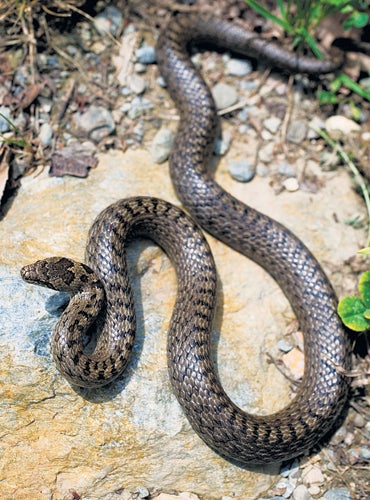The 'secretive and timid' smooth snake is sliding back into Devon's heathland

Britain's rarest snake is about to expand its range. In a pioneering wildlife project, the non-venomous smooth snake is to be re-introduced to Devon after a 50-year absence.
Currently found only on lowland heaths in Sussex, Surrey, Hampshire and Dorset, the smooth snake is not only rare, but is probably Britain's most elusive reptile. Grey-brown with black markings, it is secretive and timid, and is glimpsed far less frequently than our other two native snakes, the venomous adder and the harmless grass snake.
Historically, smooth snakes were more widespread, but disappeared from a wide area of southern England because of habitat loss. In Devon the last recorded sightings were in the 1950s. However, with the restoration of heathland over the past two decades, conservationists are now hoping to return Coronella austriaca to much of its former range, with Devon at the top of the list.
This summer, experts from the newly-formed charity Amphibian and Reptile Conservation (ARC) will collect 10 smooth snakes, under licence, from several well-populated sites in Dorset. The snakes will be taken to a special area of east Devon known as the pebblebed heaths, and released on a heathland nature reserve owned by The Royal Society for the Protection of Birds.
"This is a tremendously exciting project for us as it marks the beginning of what we hope will be the re-establishment of the species to Devon, and potentially a huge expansion of range for smooth snakes," said Nick Moulton from ARC, a group which was formed earlier this month when the charity Froglife merged with the Herpetological Conservation Trust.
"Historically, much of the former heathland areas have been lost to land use pressures, and the remaining sites are often fragmented and isolated," he said.
"The smooth snake is not very mobile and cannot naturally re-colonise isolated heathland sites. With this re-introduction, all we do is give the animals a helping hand to cross these areas. The East Devon heaths are in superb condition and very well managed, and we believe that the re-introduction has every chance of success."
The smooth snake is a priority species in the UK and the re-introduction is fully supported and licensed by Natural England, the Government's adviser on the natural environment, as well as having the help of the RSPB.
Smooth snake releases will continue every summer for the next few years to establish a healthy self-sustaining population.
Join our commenting forum
Join thought-provoking conversations, follow other Independent readers and see their replies
Comments
Bookmark popover
Removed from bookmarks